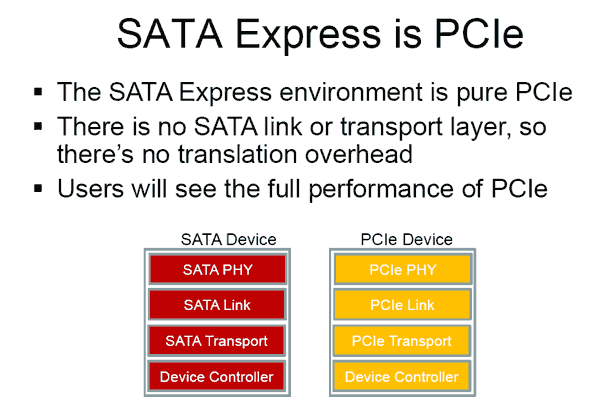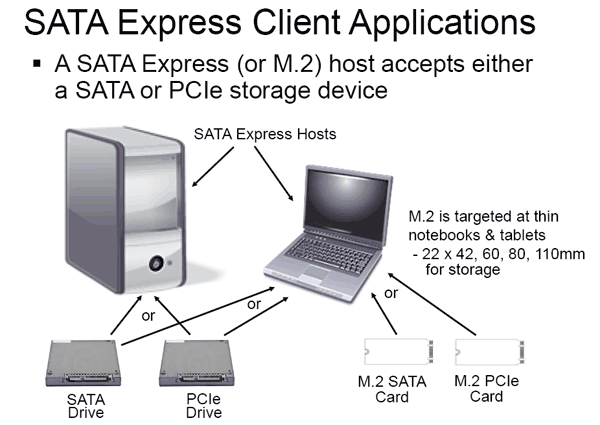
Posted on 08/13/2013 3:36:58 PM PDT by Ernest_at_the_Beach
|
The Serial ATA International Organization (SATA-IO) has ratified revision 3.2 of the SATA specification. The latest specification includes the SATA Express standard which enables the coexistence of SATA and PCIe storage devices, improves power management, caters for more new SATA form factors and contains optimisations for hybrid SSHD drives. The SATA Express specification was first introduced in January 2013 and the industry consortium that is SATA-IO ratified it as part of revision 3.2 of the SATA spec yesterday.

Enabling SATA and PCIe storage solutions to coexist will bring significant benefits![]() to users. The SATA-IO group spells out the benefits thus; "A host implemented to this (3.2) specification will connect to and function with either a SATA or PCIe storage device. PCIe technology enables increased interface speeds of up to 2GB/s (2 lanes of PCIe 3.0), compared with today’s SATA technology at 0.6GB/s (6Gb/s). The increased speed of PCIe provides a cost-effective solution for optimizing performance of Solid State Drives (SSDs) and emerging SSHDs." However if some of your storage devices don't require such a speedy interface; "Storage devices not requiring the increased speed of PCIe, such as traditional hard disk drives (HDDs) and optical drives, will continue to be supported by SATA."
to users. The SATA-IO group spells out the benefits thus; "A host implemented to this (3.2) specification will connect to and function with either a SATA or PCIe storage device. PCIe technology enables increased interface speeds of up to 2GB/s (2 lanes of PCIe 3.0), compared with today’s SATA technology at 0.6GB/s (6Gb/s). The increased speed of PCIe provides a cost-effective solution for optimizing performance of Solid State Drives (SSDs) and emerging SSHDs." However if some of your storage devices don't require such a speedy interface; "Storage devices not requiring the increased speed of PCIe, such as traditional hard disk drives (HDDs) and optical drives, will continue to be supported by SATA."

It was also noted that the new spec supports the M.2. form factor SSD drives aimed at ultra-portables. Furthermore SSHD performance is improved by the new 3.2 spec which provides a mechanism by which the host can communicate data caching information to the drive.
Turning to power management, the enhancements brought to users in SATA revision 3.2 include:
For more info on the newly ratified SATA 3.2 standard you can head over to the SATA-IO official website or read the full press release![]() (PDF) downloadable here.
(PDF) downloadable here.
ping
Without the SATA translation area, does that infer that there will be no more “proprietary” SATA Hard Drives (Hello, MSFT; I’m talking to you and your outrageously priced proprietary XBox-Only SATA HDDs)?
This was a concept that really wasn’t embraced by the industry at all (Except MSFT, for said XBox, XBox360 and XBox One) - and if it’s going away forever; it’s something that many consumers can easily live without.
Why did you have to post this, I just bought a SATA III adapter card, now I need to buy a SATA III.II card, LOL

I am not aware of any thing currently out there for common consumers.
Enterprises aren’t into solid state yet. The capacities are way too low.
boogoty boogity. pci2? cool.
Enterprise customers are very much using SSD. We have a ton of it.
Ehh... that's SORT of true. The real prohibitive factor is cost. A 240 GB SAS SSD is twice the price of a 1 TB SAS HDD. However, if you look at companies like Simplivity, who are creating insane turnkey storage systems in a 2U form factor, you're going to see a massive effort to force the old-hand HDD adherents like EMC and Dell to go more toward SSD for speed.
You have to have a massive enterprise budget to afford an EMC disk shelf with SSDs. Hell, even tier 1 storage is around $15/Gb, and that's usually spinning disk with large amounts of cache. Using SSDs in the enterprise is best for virtualization, IMO. Fast provisioning, fast boot, and you don't have a disk bottleneck when you're running on a UCS chassis or an HP BladeCenter.
Syracuse University runs a large data center, most of it the standard HDDs. They do have a couple of racks of SSDs running as a cache for the most frequently accessed data. It was a pretty impressive setup.
I've spent over 7 figures on SLC mostly over the last three years and my payback numbers are very, very, very, very, very good. The cost of servers on the rack in the data center seriously adds up, and when that server can't handle the workload because disk throughput is slooooow, it's not paying for itself.
Bookmark.
Disclaimer: Opinions posted on Free Republic are those of the individual posters and do not necessarily represent the opinion of Free Republic or its management. All materials posted herein are protected by copyright law and the exemption for fair use of copyrighted works.